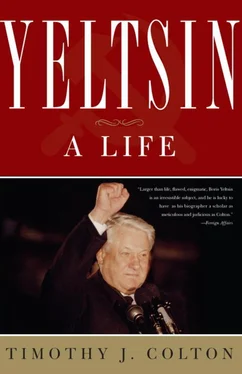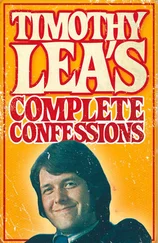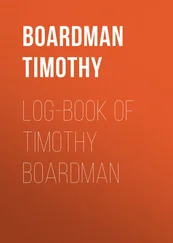15 Kiriyenko interview.
16 Mikhail Mikhailovich Zadornov, an economist who worked with Grigorii Yavlinskii on the Five Hundred Days Program in 1990, is not to be confused with Mikhail Nikolayevich Zadornov, the stand-up comedian referred to in Chapter 13.
17 Source: interviews with two of the parties to the affair. Word of it circulated in the press around May 20. Boris Nemtsov had instituted a tender system for most other civilian agencies in 1997.
18 Alexei Goriaev and Alexei Zabotkin, “Risks of Investing in the Russian Stock Market: Lessons of the First Decade,” Emerging Markets Review 7 (December 2006), 380–97.
19 At one meeting with aides, Yeltsin interrupted to dial Chernomyrdin and ask him what the trend was with Russian treasury notes. “The premier became confused and asked for time to prepare an answer. Yeltsin hung up and remarked, ‘Well there you have our premier, and he doesn’t know. But I know.’ The president beamed: See how I have left him. He wanted to be first in everything.” Baturin et al., Epokha, 734.
20 Yel’tsin, Marafon, 204. Boris Nemtsov, Kiriyenko’s mentor and now one of his deputy premiers, believed a stabilizing devaluation could have been done in the first few weeks of the Kiriyenko premiership. Like Yeltsin, he said Kiriyenko would not hear of it. Nemtsov, second interview with the author (February 6, 2002).
21 Yel’tsin, Marafon, 203.
22 Aleksandr Livshits, interview with the author (January 19, 2001).
23 Russian GKOs were first issued in February 1993. Coupon-bearing OFZs (Federal Loan Bonds) were introduced in 1995 as a complement, but GKOs defined the market throughout. Western advice paved the way for both types. Although GKOs were denominated in rubles, instruments known as dollar-forward contracts hedged against reduction in the exchange rate. Once the ruble went into collapse, the dollar-forward contracts hastened its demise.
24 See Venla Sipilä, “The Russian Triple Crisis, 1998: Currency, Finance, and Budget,” University College London, Centre for the Study of Economic and Social Change in Europe, Working Paper 17 (March 2002); and Padma Desai, “Why Did the Ruble Collapse in August 1998?” American Economic Review 90 (May 2000), 48–52. For historical perspective, see Niall Ferguson and Brigitte Granville, “‘Weimar on the Volga’: Causes and Consequences of Inflation in 1990s Russia Compared with 1920s Germany,” Journal of Economic History 60 (December 2000), 1061–87.
25 The package, and the expectation that it would be granted, aggravated the crisis by facilitating the conversion of rubles into dollars by Russian and foreign speculators. Brian Pinto, Evsey Gurvich, and Sergei Ulatov, “Lessons from the Russian Crisis of 1998 and Recovery,” in Joshua Aizenman and Brian Pinto, eds., Managing Volatility and Crises: A Practitioner’s Guide (New York: Cambridge University Press, 2005), 406–39.
26 Vera Kuznetsova, “Boris Yel’tsin v ocherednoi raz poobeshchal ne idti na tretii srok” (Boris Yeltsin makes his latest promise not to seek a third term), Izvestiya, June 20, 1998. Kuznetsova added that the mill would need to put together a sound business plan to get assistance, but the gist of Yeltsin’s remarks was that a subsidy was on the way. For a humorous account of Yeltsin’s high spirits and how he mistook a female journalist for a model from the factory, see Yelena Tregubova, Baiki kremlëvskogo diggera (Tales of a Kremlin digger) (Moscow: Ad Marginem, 2003), 81–84.
27 Mikhail Fridman, interview with the author (September 21, 2001).
28 Yel’tsin, Marafon, 211–12.
29 Indicative are remarks made by Stephen F. Cohen of New York University on The NewsHour with Jim Lehrer on September 14: “The country is in profound crisis. It’s coming apart at the seams politically, economically, socially, psychologically. The economy has collapsed. Winter is coming. People have no money. They have no food. There’s no medicine…. The so-called free market reforms in Russia have collapsed; they’re over.” Transcript at http://www.pbs.org/newshour/bb/europe/july-dec98/russia_9-14.
30 Sergei Parkhomenko, “Podoplëka” (The real state of affairs), Itogi, September 15, 1998.
31 Vitalii Tret’yakov, “Vopros o vlasti” (The question of power), Nezavisimaya gazeta, July 10, 1998.
32 Tret’yakov did not explain how to reconcile the council with the constitution or what would happen if its head disagreed with Yeltsin, who would still have the highest standing in the state, or with the prime minister, who would continue to answer to the president.
33 Family members were emphatic on this point in interviews. Some press articles in late August and early September cited Kremlin sources and even provided the date on which Yeltsin would supposedly hand in his resignation.
34 Viktor Chernomyrdin, interview with the author (September 15, 2000); and Valentin Yumashev, fifth interview with the author (September 17, 2007). Yeltsin reiterated in Marafon, 219–20, that his former prime minister was not the best leader for the future. But in August 1998 he accepted the Chernomyrdin option. Had the nomination gone through, Yeltsin, Yumashev said, could not have faced up to dismissing him a second time prior to the 2000 election.
35 Strobe Talbott, The Russia Hand: A Memoir of Presidential Diplomacy (New York: Random House, 2002), 288.
36 On the way in from the airport on September 1, Chernomyrdin “used the half-hour ride to lobby the president [Clinton] to support his nomination with Yeltsin, who was rumored to be giving up on him.” Ibid., 287. Clinton was smart enough not to intrude.
37 Vitalii Tret’yakov, “Vitse-prezident i drugiye” (The vice president and others), Nezavisimaya gazeta, September 12, 1998.
38 They were Andrei Kokoshin, secretary of the Security Council; Yevgenii Savast’yanov, deputy head of the Kremlin executive office; and Sergei Yastrzhembskii, press secretary and foreign-policy assistant.
39 Yeltsin felt after his conversations with Yumashev that a Chernomyrdin restored to the prime minister’s office would have “the aura of an unjustly offended person.” “In that sense, my moral loss would turn out to be a win for Chernomyrdin.” Marafon, 221
40 Viktor Zorkal’tsev, a Zyuganov deputy, had signed for the KPRF on August 28, and the pact was supported by Nikolai Ryzhkov and other pro-communist factions in the Duma. Chernomyrdin was more favorable to it than Yeltsin.
41 Yevgenii Primakov, Vosem’ mesyatsev plyus… (Eight months plus) (Moscow: Mysl’, 2001), 14.
42 In his memoir account (ibid., 7), Primakov says Yeltsin offered the post of prime minister to Maslyukov, in a desperate outburst in the presence of him and Chernomyrdin. Maslyukov, he says, declined the offer but said he would work under Primakov. Valentin Yumashev, who conducted most of the negotiations with other candidates, has strongly denied (interviews) that any such offer was made, as Yeltsin could not accept a member of the KPRF as his head of government. Yeltsin’s own memoir only mentions Maslyukov as someone he considered. It is possible that he made a statement that Maslyukov or Primakov misconstrued as an offer, or that he made and retracted one without informing his chief of staff.
43 This success should not be exaggerated. The day before Yeltsin fired him in May 1999, Primakov spoke proudly of having cut the state debt to pensioners in half and of public-sector doctors and teachers waiting two months for their pay instead of five.
44 Yel’tsin, Marafon, 239–40.
45 These trends are summarized in Goohoon Kwon, “Budgetary Impact of Oil Prices in Russia,” http://www.internationalmonetaryfund.org/external/country/rus/rr/2003/pdf/080103.pdf; and Philip Hanson, “The Russian Economic Recovery: Do Four Years of Growth Tell Us That the Fundamentals Have Changed?” Europe-Asia Studies 55 (May 2003), 365–82.
Читать дальше












